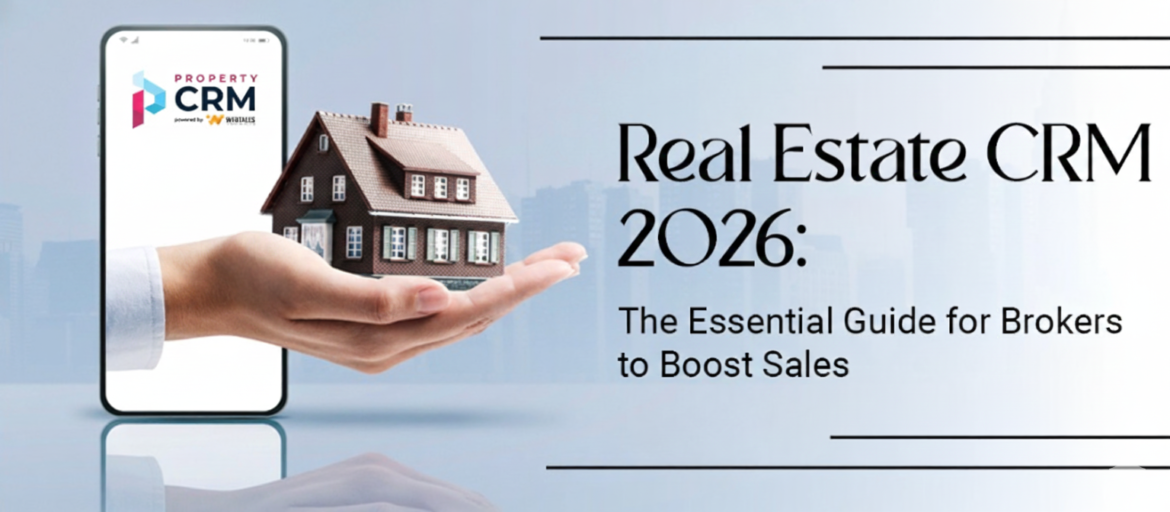This blog explores how a CRM for real estate brokers can streamline lead management, automate tasks, and boost sales. Learn how a Real estate sales CRM helps brokers stay organized, improve client relationships, and maximize revenue in 2026. Get insights on top features, benefits, and choosing the best CRM for your business.
In 2026, real estate is more competitive than ever. From managing incoming leads to closing deals efficiently, brokers face a constant challenge of staying organized, responsive, and profitable. The solution? A robust CRM for real estate brokers.
A Real estate sales CRM is no longer optional; it’s essential for tracking leads, nurturing client relationships, automating tasks, and scaling your business. In this guide, we’ll explore everything brokers need to know about choosing the best CRM for real estate 2026, from features and benefits to implementation strategies.
Table of Contents
Why Brokers Need a CRM for Real Estate
Managing multiple clients, listings, and tasks can quickly become overwhelming without a CRM for real estate brokers. Traditional methods like spreadsheets or email chains are inefficient and prone to errors.
A modern Real estate sales CRM helps you:
- Consolidate all client and lead data in one place.
- Automate repetitive tasks such as follow-up emails and appointment scheduling.
- Track interactions across multiple channels (email, calls, SMS, social media).
- Generate real-time analytics and reports to identify opportunities.
- Collaborate seamlessly with team members from any location.
By implementing a CRM for real estate brokers, you save time, reduce errors, and ensure every lead is nurtured to conversion.
Key Features of a Real Estate CRM
The right CRM for real estate brokers can transform your business. Look for these essential features:
1. Centralized Contact Management
A Real estate sales CRM stores all client and prospect data in a single location, accessible to all team members. From contact details to previous interactions, every piece of information is organized and up-to-date, ensuring no lead falls through the cracks.
2. Lead Scoring & Sales Forecasting
A smart CRM for real estate brokers prioritizes leads based on their potential to close. AI-driven insights predict which opportunities are most valuable, allowing brokers to focus on the highest-converting prospects.
3. Automation & Personalized Journeys
Automation in a Real estate sales CRM streamlines repetitive tasks: follow-up messages, reminders, meeting scheduling, and even document generation. Personalization ensures that each client receives tailored communication at the right time, improving engagement and conversion rates.
4. Task & Project Management
From property showings to contract deadlines, a CRM for real estate brokers keeps all tasks organized. Brokers can assign, track, and prioritize activities, ensuring smooth operations and no missed opportunities.
5. Reporting & Analytics
A top-tier Best CRM for brokers provides dashboards and reports to measure team performance, track sales pipelines, and identify trends. Real-time analytics help brokers make data-driven decisions for sustained growth.
6. Integrations
Seamless integrations with MLS, IDX, RETS, email marketing platforms, and accounting software make your CRM for real estate brokers a central hub for all business operations.
Benefits of a Real Estate Sales CRM

Adopting the best CRM for real estate 2026 provides tangible benefits for brokers:
- Enhanced Organization: Keep all client data, interactions, and documents in one central system.
- Time Efficiency: Automate repetitive tasks to focus on high-value activities like closing deals.
- Better Collaboration: Cloud-based CRMs allow teams to access the same information from anywhere.
- Improved Lead Conversion: Prioritize leads and opportunities that are most likely to convert.
- Stronger Client Relationships: Personalize communication and provide timely updates to clients.
- Future-Proof Growth: Scalable CRMs adapt to your business needs as you expand.
With these benefits, a Real estate sales CRM empowers brokers to consistently exceed client expectations while boosting revenue.
How to Choose the Best CRM for Brokers
Selecting the best CRM for brokers involves more than just picking a platform it requires strategy. Here’s a step-by-step approach:
1. Define Your Goals
Identify what you need from a CRM for real estate brokers. Is it lead management, automated follow-ups, advanced reporting, or full-scale sales pipeline management?
2. Scalability & Flexibility
Choose a Real estate sales CRM that grows with your business. Tiered plans and scalable features ensure that you only pay for what you need while keeping options open for future expansion.
3. Ease of Use
The best CRM for brokers must be intuitive. Complex interfaces slow adoption and reduce efficiency. Look for platforms with simple dashboards and guided onboarding.
4. Integration Capabilities
Ensure your CRM for real estate brokers connects seamlessly with MLS, email marketing tools, accounting software, and other business apps.
5. Support & Training
Even the best Best CRM for real estate 2026 requires proper training. Choose a provider with robust onboarding, tutorials, and responsive customer support.
6. Security & Compliance
Protect sensitive client data with a CRM for real estate brokers that offers role-based access, encryption, and GDPR/CCPA compliance.
Top Real Estate CRM Platforms in 2026
Here’s a brief overview of some of the leading Real estate sales CRM solutions for brokers:
| CRM Platform | Best For | Key Features | Pricing |
| Property CRM | Brokers & real estate teams | Lead management, AI analytics, automation, MLS/IDX integration, mobile access | ₹450/month (Standard) / ₹900/month (Professional) |
| Salesforce | Enterprise brokers | AI lead scoring, automation, analytics, MLS/IDX integration | Custom pricing |
| HubSpot CRM | Small to mid-sized brokers | Marketing automation, email templates, pipeline management | Free to $50+/user/month |
| Zoho CRM | SMB brokers | Workflow automation, AI insights, dashboards | $12–$45/user/month |
| Propertybase | Real estate-focused brokers | Lead management, MLS integration, marketing campaigns | $99–$129/user/month |
Digital Selling Tips for Real Estate Brokers

- Leverage Automation: Use your Real estate sales CRM to automate emails, SMS, and client follow-ups.
- Segment Your Leads: Group leads based on source, interest, or readiness to buy for personalized communication.
- Track Engagement: Monitor email opens, calls, and meetings to focus on high-potential clients.
- Mobile Accessibility: Ensure your CRM for real estate brokers is mobile-friendly for on-the-go access.
- Regularly Review Analytics: Identify trends, bottlenecks, and opportunities to optimize sales strategy.
- Integrate Social Media: Sync social platforms with your CRM to capture leads and manage interactions.
- Focus on Client Experience: Personalization and timely follow-ups increase referrals and repeat business.
Conclusion
A CRM for real estate brokers is no longer optional it’s essential to stay competitive in 2026. From streamlining lead management to automating tasks and providing actionable insights, a Real estate sales CRM ensures brokers can focus on what matters most: building relationships, closing deals, and growing their business.
By selecting the best CRM for real estate 2026, following best practices, and integrating digital selling strategies, brokers can consistently outperform competitors, provide exceptional client experiences, and maximize revenue.
FAQ
What is a CRM for real estate brokers, and why is it important?
A CRM for real estate brokers is a software solution that helps manage leads, client interactions, and property listings efficiently. Using a Real estate sales CRM ensures that brokers stay organized, automate tasks, and increase lead conversion, making it essential in 2026.
How does a Real estate sales CRM improve lead management?
A Real estate sales CRM centralizes all client and lead data, tracks communications across channels, and prioritizes high-potential leads. This helps brokers focus on the right opportunities and close deals faster.
What features should I look for in the Best CRM for real estate 2026?
Look for centralized contact management, lead scoring, automation, reporting & analytics, task management, and integrations with MLS/IDX systems. These features ensure a seamless workflow for brokers.
Can a CRM for real estate brokers help with automation?
Yes! A Real estate sales CRM automates follow-up emails, reminders, meeting scheduling, and even document generation. Automation saves time and ensures consistent communication with clients.
Which CRM is considered the Best CRM for brokers in 2026?
The Best CRM for brokers depends on your needs and team size. Platforms like Property CRM, Salesforce, HubSpot CRM, Zoho CRM, and Propertybase are highly recommended for their automation, analytics, and integration capabilities.
How can a CRM for real estate brokers improve client relationships?
By providing personalized communication, timely updates, and tracking interactions, a CRM for real estate brokers strengthens relationships, increases client trust, and boosts referrals.
Is it worth investing in a Real estate sales CRM for small brokerage teams?
Absolutely. Even small teams benefit from CRM for real estate brokers because it streamlines lead management, automates repetitive tasks, and helps compete with larger agencies efficiently.
How do integrations enhance the functionality of a CRM for real estate brokers?
Integrations with MLS, IDX, accounting software, and email marketing tools turn a Real estate sales CRM into a central hub, reducing manual work and improving data accuracy.
Can the Best CRM for real estate 2026 scale with my growing business?
Yes. Modern CRM for real estate brokers offer scalable plans and features, allowing you to expand your operations without switching platforms, ensuring future-proof growth.
How do I choose the right CRM for real estate brokers?
Focus on your goals, ease of use, scalability, integration capabilities, support, and security. The Best CRM for real estate 2026 should match your workflow while enhancing efficiency and client satisfaction.



